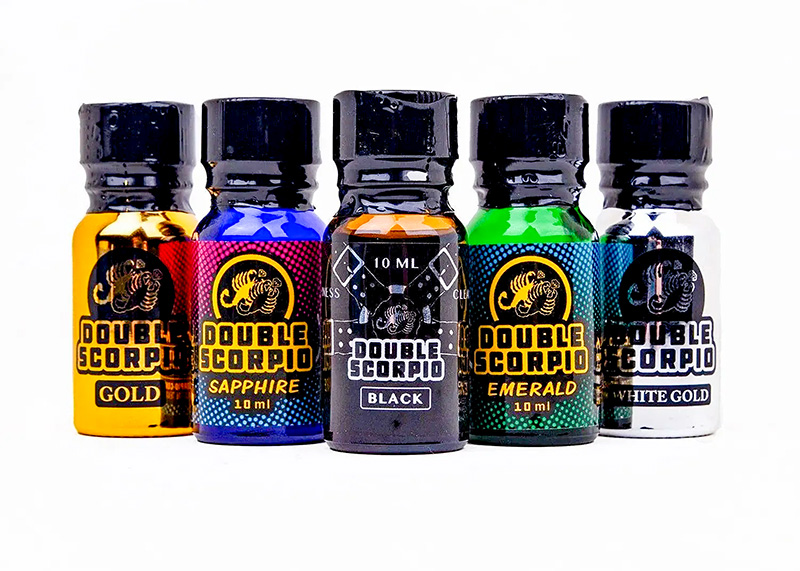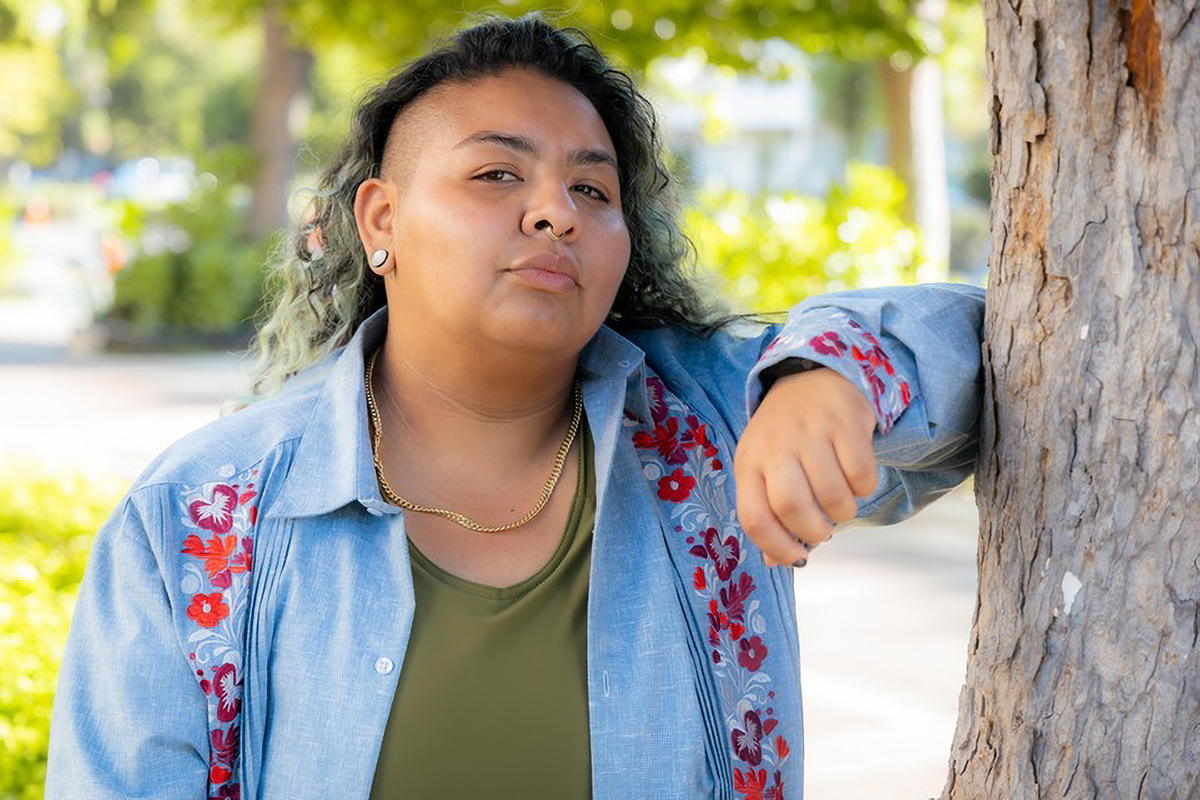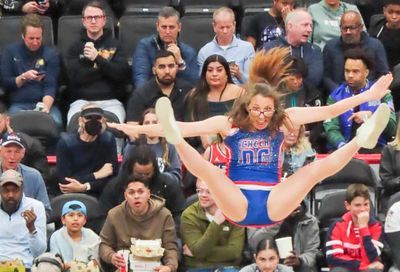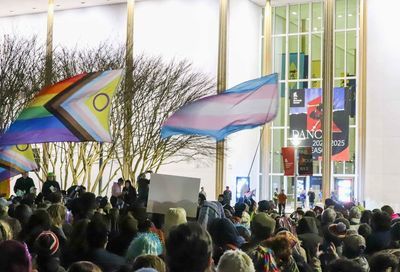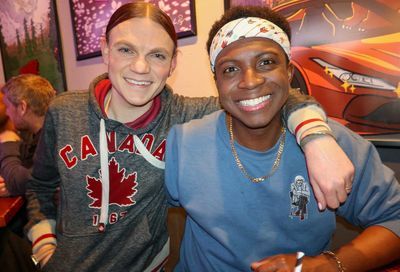Moving Forward
Marie Johns wants to make a 'Better' pitch for the city's GLBT community
The third in an occasional series of interviews and stories on the 2006 D.C. mayoral race.
As the D.C. summer begins its annual shift into high gear, so does this year’s mayoral campaign. The Sept. 12 primary elections are, essentially, just around the corner, and the candidates are making ever stronger pitches for their messages to be heard.
While much of the focus in the early months of the campaign focused on initial frontrunners, some less-well-known candidates are quickly gaining ground in attracting the attention of voters just beginning to get invested in the race.
Marie Johns is one of those candidates. A natural born Hoosier whose 25-year telecommunications career path led her from her segregated beginnings in Indianapolis to her tenure as president of Verizon in the nation’s capital, Johns is banking on her ”common sense approach” and long-time executive management skills to take the lead in the mayoral race.
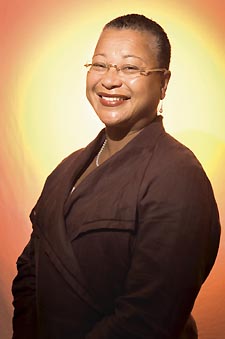 Johns |
Johns, 54, and her husband Wendell, 56, came to the D.C. area in 1984 with their young son, Richard, and quickly came to love their adopted home. They joined Metropolitan African-Methodist Episcopal’s downtown congregation, and she involved herself in an array of volunteer and service activities that might seem daunting to a person with less energetic approach. That involvement led her, after her retirement from Verizon, to take on the quest for the mayor’s office.
”I believe that Washington, D.C., is one of the most blessed jurisdictions anywhere on the planet,” says Johns. ”We have so much here to work with in terms of intellectual capital, cultural resources, creativity, cold hard cash. We really are the envy of so many places.”
Johns focuses on education and opportunity as tools to solve some of the more intransigent problems that still fact the city despite its recent economic growth.
”I know if we become a more educated city that we’ll be healthier, we’ll be safer, we’ll be more economically vibrant, we’ll be a stronger city for everyone,” she says. ”That’s the whole notion behind the ‘Better City for All’ tour that I’m doing as part of this campaign.”
Her efforts have also brought her increasing attention from the city’s gay and lesbian community, with her support for marriage equality and other important issues. Johns outlined those issues and others in an exclusive interview with Metro Weekly.
METRO WEEKLY: What was it like growing up in Indianapolis in the 1950s?
MARIE JOHNS: Indianapolis was a very typical Midwestern place. We were the big city — it’s the state capital. Much of the state is rural, but I had an urban upbringing, or at least as urban as it gets in Indiana. I remember the city being segregated. There were places I was not able to go, so that’s a vivid memory from my childhood.
MW: What was your first awareness of segregation?
JOHNS: My first memory is from when I was 5 or 6 — it was the Riverside Amusement Park. Even at an early age I was a big fan of amusement parks. I remember asking my parents if I could go, and my father saying I couldn’t because the park only allowed ”Negro” children one day during the year. ”If I can’t take you when I want to take you, then we’re not going,” he said.
My father dealt with a lot of discrimination because he was on the police force in Indianapolis — he was among the first African Americans to be hired. He was often angry: angry at the discrimination, angry at how difficult it was, angry that he couldn’t realize all his potential because of the limitations. I remember, even as a young person, feeling sad about that.
MW: Anger in a family — even anger that’s justified — can have an impact on the family members. What effect did it have on you?
JOHNS: Anger is corrosive and our family didn’t escape that. I’m the oldest of three girls. My parents were wonderful, hard-working parents. They sacrificed a lot for my sisters and me, and even though my parents didn’t have the benefit of a college education, my sisters and I are all college educated. But their relationship didn’t survive it. Quite frankly, that’s a great sadness for me. Even as an adult child of divorce, it’s still sad.
MW: Did you carry some of that anger as well, considering that you lived through that segregation yourself?
JOHNS: The anger stays with me still. I’ve tried to reorient it in a positive way as a motivator. That’s why the issues of education and opportunity are so important to me. While we don’t have the [official] segregation that I lived through, the economic segregation that occurs when people don’t have opportunity or education is just as insidious.
MW: What was the first time a gay or lesbian person came out to you?
JOHNS: The first time that I really had a very frank conversation about sexual orientation was when a friend of mine, when I was at Bell Atlantic, told me that she was a lesbian. She was involved in a very meaningful relationship that was just getting underway, and she sought my advice about coming out to other members of the team. Her inclination was to come out at a staff meeting with everyone present. I said, ”That’s fine, that’s one approach.” Then I suggested that she might want to think about another approach — she was in a relationship, she was very much in love, and she should act as anybody in love often does. And that means talking about the person, recounting what they did over the weekend in general conversation, bringing pictures of her into the office — all those things that everybody does if they’re in a relationship. And in that way, it would allow her to talk about her relationship in less of what could be a confrontational way.
MW: Did that work out fairly well?
JOHNS: Yes. She ended up taking my advice and later on we laughed about it, because we had had some pretty funny scenarios about what might have happened if she had gone the big announcement route.
MW: We tend to use this term ”GLBT” interchangeably with gay and lesbian. I’m not sure we always mean ”transgender” when we say it. What’s the first interaction that you had with someone who was transgender?
JOHNS: While I have met people who are transgender, quite frankly that’s a constituency within the GLBT community I seek to know more about. I don’t know as much as I would like to know in terms of understanding how to ensure their safety and security. I know that that is an area of concern. I am familiar with what happened to Tyra Hunter, where public employees did not serve this person with the respect and dignity that she should have had.
MW: Do you think that the non-GLBT community understands the level of fear on the part of some transgenders, in particular when it comes to dealing with the government?
JOHNS: No, I don’t. As mayor, that is high on my agenda, to make sure that everybody in the city feels safe — transgenders, as well as gay and lesbian youth who are concerned about their safety at school and other places. Safety is a fundamental issue and we have to do a better job. It will entail educating more of the broader community about what some of these particular safety issues are.
 Johns at 2006 Capital Pride Parade |
MW: Marriage is one of the biggest and hottest issues around gays and lesbians these days. What’s your position on gay marriage?
JOHNS: I believe in full marriage equality in civil marriage. I believe that every church should have the right to recognize or not recognize same-sex marriage, whatever their faith tradition is. But as mayor, I support full marriage equality.
MW: Do you think that the distinction between religious and civil marriage gets lost in the discussion?
JOHNS: Yes, unfortunately it does. I had an encounter just this past weekend when I was campaigning. I was introducing myself to a gentleman standing in his driveway and his wife came hurriedly down the stairs to join the conversation. She said, ”Excuse me, Mrs. Johns, I believe I read something where you are in favor of gay marriage.” I said, ”Yes, I’m in favor of full marriage equality and civil marriage but I also respect churches’ rights to recognize or not recognize those ceremonies.” She then went into a very lengthy conversation about her belief and her church and how that was wrong and so on. She wasn’t even hearing what I was saying, I don’t think, in terms of the separation. It really is unfortunate because, as I was trying to explain to her, the last thing I would do is to try to dictate what her church ought to do. By the same token, as I said, if I’m fortunate enough to serve as mayor of this great city, I’m going to be the mayor for everyone.
MW: Even though you support gay marriage equality, Congress has threatened action should anything pro-gay happen on the marriage front in D.C. Would there be any changes that you would see making to the city’s current policies if you were mayor — or is your position something more symbolic?
JOHNS: I don’t mean this as an empty gesture, but by the same token we have to understand the realities of being the last colony. We have to make sure that nothing is done that’s going to endanger the rights that we already have. What I would do about this issue, as I would with other issues, is get direct input from the community and work to figure out what makes sense for us. And to proceed with that, as long as we understand we’re not bringing grave consequences.
MW: Given all that, how would you anticipate working with a Congress that, as of now, is still fairly hostile to a lot of the concerns of the district?
JOHNS: It’s communication — that’s the key for everything. Also, I don’t think we’ve reached out enough. There are Republicans in Washington who are well-connected and who could be very helpful. And believe me, I will lean on them, as citizens of the city, to help us make the most effective case for getting done what we need to get done, and for getting the necessary Congressional approval. For example, I will make a case for needle exchange, because the data clearly shows that an effective needle exchange program is an important intervention strategy for stemming new cases of HIV/AIDS. Given our crisis in the city, I think it’s irresponsible for us not to employ every possible opportunity to stem this tide.
MW: Sen. Sam Brownback [R-Kansas], who chairs the appropriations subcommittee on the district, has been very adamant about the fact that needle exchange is a line that he’s not going to have crossed. Do you have an idea about how to get past that?
JOHNS: I’ll be very candid — I don’t have a full-fledged nine-point plan on how to do it. But any initiative starts with the recognition that it’s something important to do and then starts down the road of figuring out how to get it done. Minds can change. Effective cases can be made. It’s not like we would be the only needle-exchange program in the country. Other cities have needle-exchange programs and they are working, so we just have to build a case.
MW: You’ve talked about needle exchange programs. What other issues are a priority for you in approaching HIV/AIDS in the city?
JOHNS: I’ve already committed that I will be screened [for HIV] every six months during my tenure as mayor. One of the most important things that we need to do regarding HIV and AIDS is de-stigmatize the disease, because the fear people have about even finding out that they have the disease keeps us more vulnerable to new infections. Screening for HIV and AIDS should become as much a part of a regular health screening as a mammogram or a PAP smear or a blood pressure test.
And also, me being a heterosexual, African-American woman undergoing a screening on a regular basis sends the message that this is not a gay disease anymore. It may have started as being defined as such, but it isn’t any longer. It’s a disease that affects all of us. And, quite frankly, I am the face of the largest growing cohort of new infections — African-American women. We have to marshal all the resources that we have in the city to have a more effective response to treating people with the disease and stemming the growth of new infections.
MW: One of your policy stances is that you would create an ”AIDS czar” position. How would you see that working?
JOHNS: We have a crisis in this city, so it’s important that we have an ”all hands on deck” approach to creating a more coordinated and comprehensive response. The purpose of the AIDS czar would be to help connect the government’s resources, such as mental health services and substance abuse services, more effectively, because people living with the disease or who are vulnerable to the disease often have other health concerns as well. The AIDS czar [would] help me as mayor figure out how to pull the pieces together in a more coordinated way so that we can help more people.
”Czar” is a term I’m using right now — the main thing is that it’s a person who will have direct access to me, not be buried somewhere in the trenches. Right now, I see the city having far too much of a scattershot approach. With some good thinking and input from many people in the community who are very involved and very knowledgeable about these issues, we can pull together our resources in a more effective way to have a stronger response.
MW: Over the past few months, there have been a handful of incidents, including anti-gay sermons, that raised tensions between some African-American churches and the GLBT community. How do you see the potential role that you can play in resolving the tension between some African-American religious leaders and the GLBT community?
JOHNS: [These incidents are] always unfortunate and hurtful. As someone who has experienced discrimination, it disturbs me when I see those dynamics played out in other scenarios. As mayor, I will take very seriously my role as mayor for the entire city and use the power of the mayor’s office to bring us together in a loving and a caring way so that we can understand each other more and learn how to live peaceably and productively together in our great city.
Awareness and enlightenment come from sitting down and talking. That’s where the mayor can play — and if I’m fortunate enough to serve as mayor, will play — an important role by sending the signal from the leadership of the city that we are one community. We may not always understand everything, there may be fears or concerns about certain things, but the most important thing that we must do is to sit and talk with one another so that we can work through whatever issues divide us. Tolerance and love have to be fundamental values in our city. They have to be what we stand for.
I have facilitated very small, private conversations between African-American clergy and representatives of the GLBT community because I feel strongly that we have to bring all segments of the community together. The real issues are the fact that less than half of our boys who start 9th grade are present to pick up a diploma in 12th grade. Our issues are the fact that too many of us are dying needlessly from diabetes and kidney failure and other diseases. Our issues are how do we come together as a community to address HIV/AIDS? These are the things that I want to lead us to focus on. I believe that we are a stronger community if we are bound by loving families, regardless of what those families look like.
MW: The black community is often seen as a Democratic community and, because of that political identification, as a liberal community. Do you think people are surprised sometimes to see a conservative aspect to the community, or at least a broader range of opinions and ideas about certain issues such as sexual orientation?
JOHNS: You’re absolutely right. We’re generally too broad-brushed in our definitions, that Democrat equals liberal, Republican equals conservative. We can’t label things as clearly as that. The black church is such an important and treasured institution for many African Americans — it certainly is for me — that it’s the clash of biblical teachings and issues related to the GLBT community that I think is the fault line along which some of these tensions occur. But where I go, as a Christian, is that God made us all and commanded us to love each other as we love ourselves. And so that’s my belief.
MW: The growth of the real estate market and gentrification issues are huge in D.C. right now. On the 9th Street corridor, we’ve had some controversy over Be Bar, a new gay bar planning to open. There seems to be a lot of issues of sexual orientation and race boiling there, with some very religious-based opposition to the new business. How do you balance those issues?
JOHNS: The most important issue is to make sure there aren’t inappropriate businesses, regardless of who the owner is, in proximity to certain institutions, whether it’s a church, a school, a nursing home or a hospital. The situation with Be Bar appeared to be a case of no political leadership to bring the different factions together early on so that we could work through whatever issues needed to be addressed. It’s similar to what happened with church parking, which has been an issue in that same area. We waited until there were warring factions protesting on a Sunday morning. It should not have gotten to that point.
What was troubling was that the sexual orientation of the owner became an issue. I can understand why we have to have certain considerations of where businesses should be placed. But in any major city, when you have downtown congregations they sit amidst restaurants and lounges and all sorts of businesses. So Washington should not be any different.
MW: Education is a big topic in your campaign. For GLBT students in the district, education is a big issue as well because there are issues of access, homelessness and discrimination that affect their ability to get an education. How do you approach those issues and needs of GLBT students within a system that already has a fair number of problems educating the children of the city as a whole?
JOHNS: For many of our GLBTQ students, the big issue is safety: safety from physical harm, safety from the harassment that can sometimes take place. That’s where I would start, making sure that these students are safe and can learn. We may have to do more in some very different directions, even things that may border on radical. I know in New York City there is a school for GLBTQ students [the Harvey Milk High School]. Perhaps that is something we should explore — I would be open to that if it means we can maintain a safe and healthy environment for all students.
We need to take the blinders off and look at how we can use our resources more effectively to make sure that our students are safe. Quite frankly, failure to do so is just going to create a bigger cost for us down the road. We have to break the cycle of GLBTQ students dropping out of school, living on the streets, becoming sex workers and contracting and then passing along HIV/AIDS and other sexually transmitted diseases. So that’s why we have to be creative about how do we make sure that these students are in school, learning, and on a productive path.
MW: This election is a very interesting election, in that there’s now a pretty large Democratic field in a five-way race. How do you see the race and your strategy?
JOHNS: I see this as a three-way race. One of my competitors has been in office for nearly 30 years and has had her chance to show her leadership on these long-standing issues related to building stronger people and stronger families in this city — she’s had ample opportunity. My other competitor is an energetic campaigner but is light on experience. The job of a legislator is not the same thing as the job of mayor. The skills required are different. I am unique among all the candidates in that I’ve had the day-to-day accountability of delivering results. I am the only one who has executive leadership, managerial experience.
But even beyond that, I had a very challenging day job but I found time and cared enough about this city that I didn’t stop there. I went out and looked for opportunities to serve this community. I felt a responsibility to do that as an African-American woman business leader, which was and continues to be unique in Washington, ”Chocolate City” though we may be. So that’s what led me to create job training programs at Bell Atlantic to train out-of-school youth in the telecommunications industry so that they would be qualified for excellent entry-level jobs in our industry, which they did get. That’s what led me to create the Washington DC Technology Council when, in the middle of the dot-com boom, no one was using ”Washington, D.C.” and ”technology” in the same sentence. It was my love for the city and my desire to serve that led me to be engaged in organizations from the Girl Scouts to the D.C. Chamber of Commerce.
I could go on, but the point of the matter is that I know we are in the critical days leading up to the primary and when people across the city decide who they want to cast their vote with, who will best lead the city, they will look to relevant experience and the record of service for the candidates. And I feel confident that I will win their support.
MW: I’ve lived in the area since 1989, and I remember well how bad the city got. We’ve had Mayor Anthony Williams in for a while, as well as the D.C. Council leadership. I know there are some problems that remain to be addressed for the city, but a lot of the infrastructure for solving these problems has really grown and strengthened over the past few years. Although you have a lot of executive experience, what would you say to people who may be concerned about any risk in making such a big change in the city’s top leadership?
|
JOHNS: You know what? You can’t get around the fact that a change is coming. Of all the candidates in the race, none have been the mayor. I go back to what experience is most relevant. I can’t see how people will view a term-and-a-half councilmember as having the relevant experience.
The district government was my second-largest customer [at Verizon] so I don’t feel at all that I’m a newcomer or an outsider to the government. I’ve not worked in the executive branch of government, but neither have most of the candidates. The fact of the matter is that Washington is no different from other jurisdictions. Michael Bloomberg hadn’t worked in the New York City government. Mark Warner hadn’t worked in the Virginia government or been a part of the Virginia State Legislature. What the city needs is someone who not only has relevant experience but also knows how to reach out to bring in other experience that’s needed.
That’s what I’m talking about in terms of relevant experience, because, yes, economies are cyclical. This current mayor has enjoyed an incredibly fortunate economic ride. Chances are that that is not going to continue in the same way forever. That’s all the more reason why we have to have a mayor who can manage through lean times. Look at my campaign — let’s use that as an example of being able to manage with a lean team. [Laughs.] But seriously, the management experience and the ability to bring together partnerships are going to be critical for leading our city.
MW: What’s the last thing you want to say to GLBT voters who are making up their minds right now?
JOHNS: I would say that I love you, that you are a tremendous force in this city, that your presence adds to the richness of the texture of our city. And if I’m fortunate enough to serve as your mayor, I’m going to seek your help in moving this great city forward.
More information about Marie Johns and her campaign can be found at www.johnsformayor.com.
Support Metro Weekly’s Journalism
These are challenging times for news organizations. And yet it’s crucial we stay active and provide vital resources and information to both our local readers and the world. So won’t you please take a moment and consider supporting Metro Weekly with a membership? For as little as $5 a month, you can help ensure Metro Weekly magazine and MetroWeekly.com remain free, viable resources as we provide the best, most diverse, culturally-resonant LGBTQ coverage in both the D.C. region and around the world. Memberships come with exclusive perks and discounts, your own personal digital delivery of each week’s magazine (and an archive), access to our Member's Lounge when it launches this fall, and exclusive members-only items like Metro Weekly Membership Mugs and Tote Bags! Check out all our membership levels here and please join us today!




